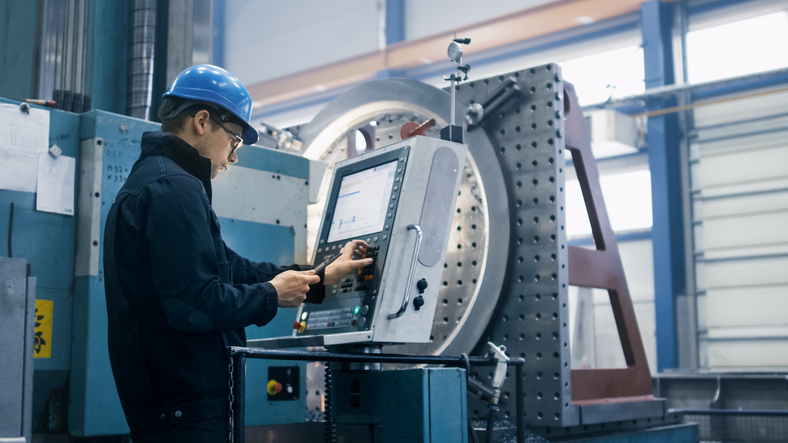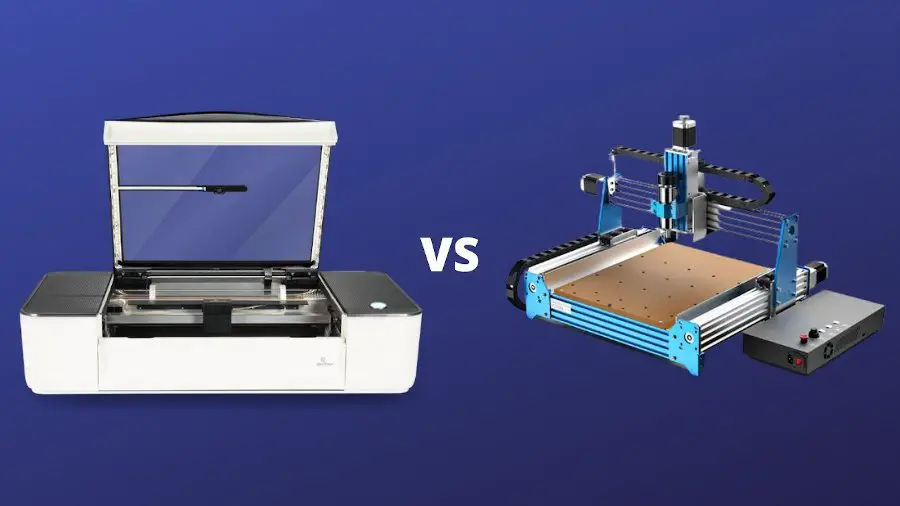Table of Contents
CNC milling is a highly specialized area that requires skilled professionals to operate the machinery. These machines are used to produce complex parts and components used in various industries such as aerospace, medical, and automotive. A CNC mill operator is a trained professional who operates these machines to produce precise and accurate components according to the design specifications.
To become a CNC mill operator, one needs to have a solid understanding of the machine’s operation and programming. The operator needs to be able to read and interpret blueprints, understand the mechanics of the machine, and have knowledge of the materials being used. The role of a CNC mill operator is crucial in ensuring the quality and accuracy of the final product, making them an essential part of any manufacturing process.
A CNC mill operator is a person who operates a computer numerical control (CNC) machine. This machine is used for cutting and shaping different materials such as wood, plastic, and metal. The CNC mill operator is responsible for programming the machine to perform specific tasks, as well as monitoring the machine to ensure it is operating correctly. The operator must also perform routine maintenance on the machine to keep it in good working condition.
What is a CNC Mill Operator?
A CNC mill operator is an individual who operates a CNC (Computer Numerical Control) milling machine. The operator uses the machine to produce precision parts and components according to specific design specifications. CNC milling machines use computer-aided design (CAD) software to control and manipulate the cutting tools that remove material from the workpiece. The operator must have a strong understanding of the machine’s capabilities and be able to interpret and execute complex instructions.
Responsibilities of a CNC Mill Operator
As a CNC mill operator, your primary responsibility is to operate the machine and produce high-quality parts to meet the desired specifications. You will be responsible for setting up the machine, loading the necessary tools and materials, and configuring the software to execute the job. You will also need to monitor the machine’s progress and make adjustments as necessary to ensure that the parts are produced accurately and efficiently.
In addition to the technical aspects of the job, CNC mill operators must also be able to troubleshoot and diagnose problems that may arise during the production process. This requires a strong understanding of the machine’s mechanical components and the ability to identify and fix issues in a timely manner.
Skills and Qualifications
To become a successful CNC mill operator, you must have a solid understanding of mathematics and computer programming. You should be familiar with CAD software and have experience with manufacturing processes and materials. You should also possess strong problem-solving skills, attention to detail, and the ability to work independently or as part of a team.
In addition to these technical skills, CNC mill operators must also possess excellent communication skills and the ability to follow written and verbal instructions. They must be safety-oriented and able to work efficiently under pressure to meet tight deadlines.
Benefits of Being a CNC Mill Operator
There are several benefits to pursuing a career as a CNC mill operator. Firstly, it is a highly skilled profession that is in demand in various industries, including aerospace, automotive, and medical. This means that job security and opportunities for advancement are available.
Secondly, CNC mill operators are paid well for their expertise and can earn a comfortable living. Additionally, the job offers the opportunity to work with cutting-edge technology and be part of the manufacturing process for complex and intricate parts and components.
CNC Mill Operator vs. Manual Milling
While manual milling is still used in some industries, CNC milling has become the preferred method due to its accuracy and efficiency. CNC milling machines are computer-controlled and can produce parts with a high degree of precision, consistency, and speed. Additionally, CNC milling machines can be programmed to produce complex shapes and designs that would be difficult or impossible to achieve with manual milling.
Manual milling requires a skilled operator to control the machine and produce the necessary parts. This process is slower, less accurate, and more prone to errors. While manual milling may be suitable for some applications, CNC milling is the preferred method for high-volume production and high-precision parts.
Training and Education
To become a CNC mill operator, you will need to complete a training program that covers the necessary technical skills and knowledge. Many technical schools and community colleges offer programs in CNC machining and manufacturing technology that provide hands-on training with CNC milling machines.
Additionally, some employers may offer on-the-job training for individuals with basic manufacturing experience. This training may include an apprenticeship program or a combination of classroom and hands-on training.
Career Path and Advancement
With experience and additional training, CNC mill operators can advance to more complex and challenging roles within the manufacturing industry. Some potential career paths include CNC programmer, manufacturing engineer, or production supervisor.
Advancement opportunities may also be available within the company, such as a lead operator or team leader position. With a strong work ethic, dedication to learning, and a commitment to safety and quality, CNC mill operators can build a successful and rewarding career in the manufacturing industry.
Conclusion
In summary, CNC milling is a highly skilled profession that requires a combination of technical knowledge, problem-solving skills, and attention to detail. CNC mill operators play a critical role in the manufacturing process by producing high-precision parts and components that are used in various industries.
If you are interested in pursuing a career as a CNC mill operator, it is important to gain the necessary education and training to develop your skills and knowledge. With dedication and hard work, you can build a successful and rewarding career in this exciting and dynamic field.
Frequently Asked Questions
Here are some commonly asked questions about CNC Mill Operators:
What does a CNC Mill Operator do?
A CNC Mill Operator uses computer-controlled machines to cut and shape metal or other materials into precise shapes and sizes. They use blueprints, schematics, and computer-aided design (CAD) software to program the machines and oversee their operation. These machines can produce complex parts with high accuracy and consistency, making them popular in industries like aerospace, automotive manufacturing, and medical device production.
As a CNC Mill Operator, you would be responsible for setting up the machines, loading materials, and adjusting the cutting tools as needed. You would also monitor the machines throughout the production process, making sure they are running smoothly and addressing any issues that arise. You may also be responsible for performing routine maintenance on the machines to keep them in good working order.
What qualifications do you need to become a CNC Mill Operator?
Most CNC Mill Operator positions require a high school diploma or equivalent, as well as some vocational training in machining or related fields. Some employers may also prefer candidates with an associate’s degree in a relevant field. In addition to formal education, you will need to have strong math skills, including knowledge of geometry and trigonometry, as well as good computer skills and mechanical aptitude.
Many CNC Mill Operators start as apprentices or trainees, learning the skills and techniques of the trade under the guidance of experienced machinists. As you gain experience and skills, you may be able to move into more advanced positions or specialize in a particular type of machining.
What are the job prospects for CNC Mill Operators?
The job outlook for CNC Mill Operators is generally positive, as many industries continue to rely on these machines for precision manufacturing. According to the Bureau of Labor Statistics, employment of machinists (including CNC operators) is projected to grow 3 percent from 2019 to 2029, about as fast as the average for all occupations. However, job opportunities may vary depending on your location and the specific industry you work in.
With experience and additional training, CNC Mill Operators may be able to advance into supervisory or management roles, or specialize in a particular type of machining, such as tool and die making or precision grinding.
What are the working conditions like for CNC Mill Operators?
CNC Mill Operators typically work in manufacturing settings, such as factories or machine shops. These environments can be noisy and require standing for long periods of time. You may also be required to wear protective equipment, such as safety glasses or earplugs, to prevent injury. The work may be physically demanding, as you may need to lift heavy materials or operate machinery that requires strength and dexterity.
However, many CNC Mill Operators find their work rewarding, as they get to use their skills and knowledge to create precision parts that are used in a variety of industries. The work can also offer opportunities for advancement and career growth.
What is the salary range for CNC Mill Operators?
The salary for CNC Mill Operators can vary depending on factors such as experience, location, and industry. According to the Bureau of Labor Statistics, the median annual wage for machinists (including CNC operators) was $44,420 as of May 2020. The lowest 10 percent of earners in this field made less than $29,810, while the highest 10 percent earned more than $66,930.
However, it’s important to note that these figures may not reflect the full range of salaries for CNC Mill Operators, as wages can vary widely based on factors such as education, skill level, and job responsibilities.
In conclusion, a CNC mill operator is a skilled technician who operates a computer numerical control (CNC) machine to produce precision parts and components. This job requires a high level of technical knowledge and attention to detail.
The role of a CNC mill operator is crucial in modern manufacturing. These professionals work with complex machines that require intricate programming and precise calibration. By operating CNC machines, they help manufacturers produce high-quality products with minimal errors and waste.
If you are interested in becoming a CNC mill operator, it is important to have a solid understanding of programming, machining, and quality control. With the right training and experience, you can build a successful career in this exciting field and make a valuable contribution to the manufacturing industry.
Request a quote today!
[contact-form-7 id="1578" title="Contact form"]
Please compress the file into a ZIP or RAR file before uploading. Alternatively, send through your RFQ by email.
enquires@unitymanufacture.com





